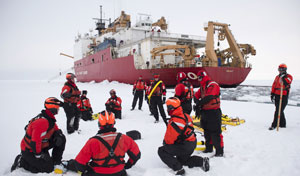Arctic nations recently met to pledge cooperation on emergency maritime response and combined operations in the world’s northernmost seas, including a joint search and rescue (SAR) exercise in September off the coast of Iceland.
Adm. Paul Zukunft, U.S. Coast Guard commandant, joined leaders representing Canada, Denmark, Finland, Iceland, Norway, Sweden and the Russian Federation in signing a joint statement at the March meeting of the Arctic Coast Guard Forum (ACGF) in Boston.
“This forum — one of many ways in which the Coast Guard uses our unique roles to enhance our nation’s diplomacy — has quickly established itself as a premier platform for fostering safe, secure and environmentally responsible maritime activity in the Arctic,” Zukunft said.
The ACGF was established in 2015 to leverage collective resources to foster safe, secure and environmentally responsible maritime activity in the Arctic. Since the forum’s inception, working groups have established strategies, objectives and tactics to achieve common operational goals in the region.
The joint agreement signed in March establishes “voluntary guidelines for combined operations and a strategic roadmap outlining the ACGF’s direction under Finland’s chairmanship.” The Boston meeting marked the formal transition of leadership of the group from the U.S. Coast Guard to the Finnish Border Guard.
As a direct result of the forum, Exercise Arctic Guardian will take place in the Denmark Strait off the coast of Iceland in September to enhance search and rescue coordination. Planning conferences for Arctic Guardian were held in Iceland in May and August.
“As the U.S.’ lead federal agency for maritime activity in the Arctic, this is a great opportunity to work with our Arctic partners to ensure that collectively we can provide the safest environment possible for those living and working in the Arctic, ” said spokeswoman Alana Miller of the U.S. Coast Guard’s Office of Government Affairs.
The forum coordinates activities with the Arctic Council and the Arctic Council’s Emergency Preparedness, Planning and Response (EPPR) Working Group. The Arctic Council is the high-level intergovernmental group that addresses issues faced by the eight Arctic governments and the indigenous people of the Arctic.
There is no formal connection between the International Maritime Organization (IMO) and either the ACGF or the Arctic Council. The IMO is the United Nations agency responsible for setting guidelines for the safety and security of shipping and the prevention of marine pollution by ships.
That said, “the seas do not have hard boundaries, so the IMO welcomes collaboration in all maritime issues, particularly when it comes to preparedness and response,” said spokeswoman Natasha Brown.
Further, the International Convention on Maritime Search and Rescue, as amended, calls for parties to “individually, or in cooperation with other states . . . participate in the development of search and rescue services to ensure that assistance is rendered to any person in distress at sea.”
“So, the adoption of doctrine, tactics, procedures and information-sharing protocols for emergency maritime response and combined operations in the Arctic is to be welcomed,” Brown said.

